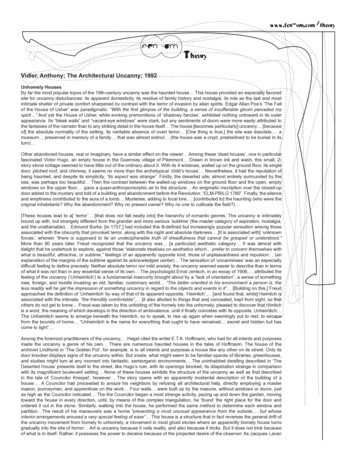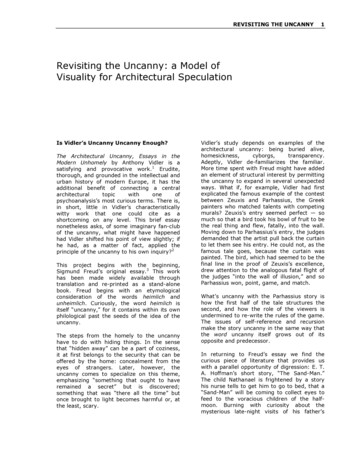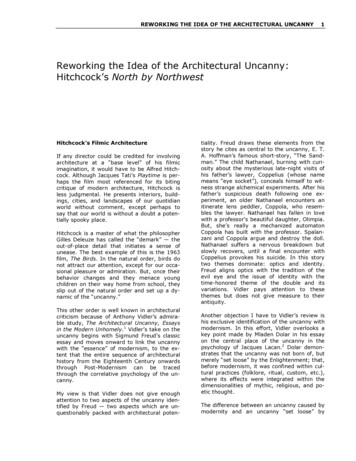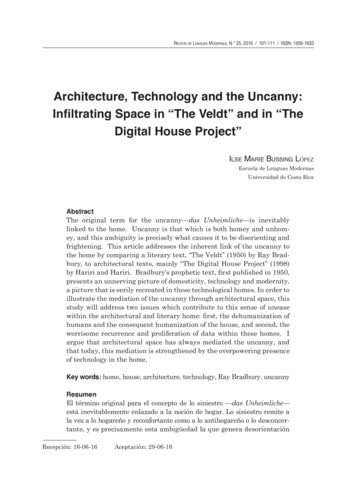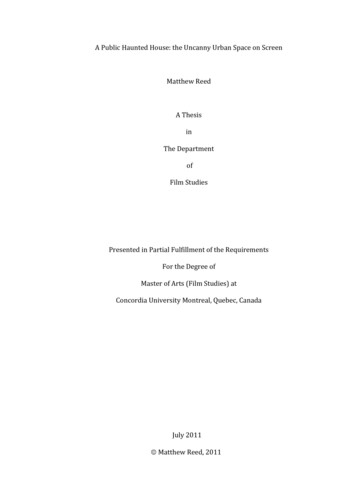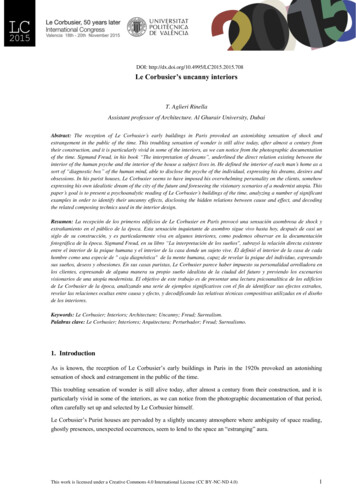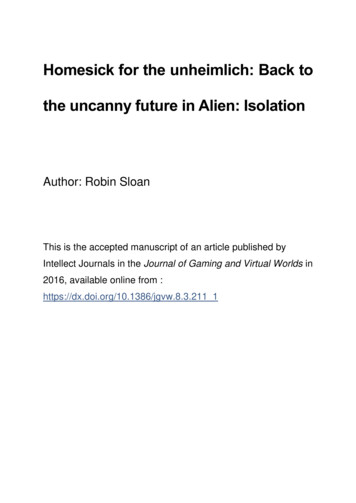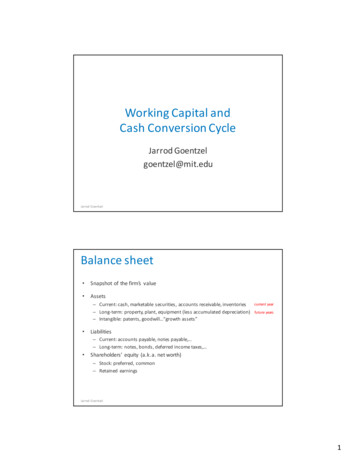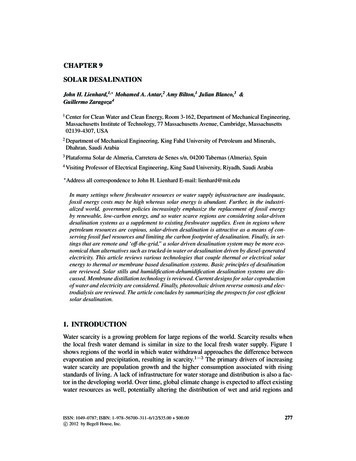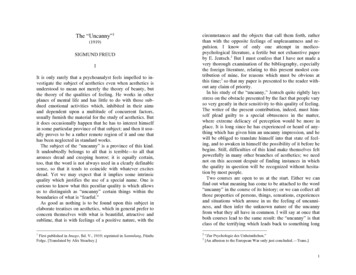
Transcription
The “Uncanny”1(1919)SIGMUND FREUDIIt is only rarely that a psychoanalyst feels impelled to investigate the subject of aesthetics even when aesthetics isunderstood to mean not merely the theory of beauty, butthe theory of the qualities of feeling. He works in otherplanes of mental life and has little to do with those subdued emotional activities which, inhibited in their aimsand dependent upon a multitude of concurrent factors,usually furnish the material for the study of aesthetics. Butit does occasionally happen that he has to interest himselfin some particular province of that subject; and then it usually proves to be a rather remote region of it and one thathas been neglected in standard works.The subject of the “uncanny” is a province of this kind.It undoubtedly belongs to all that is terrible—to all thatarouses dread and creeping horror; it is equally certain,too, that the word is not always used in a clearly definablesense, so that it tends to coincide with whatever excitesdread. Yet we may expect that it implies some intrinsicquality which justifies the use of a special name. One iscurious to know what this peculiar quality is which allowsus to distinguish as “uncanny” certain things within theboundaries of what is “fearful.”As good as nothing is to be found upon this subject inelaborate treatises on aesthetics, which in general prefer toconcern themselves with what is beautiful, attractive andsublime, that is with feelings of a positive nature, with the1First published in Imago, Bd. V., 1919; reprinted in Sammlung, FünfteFolge. [Translated by Alix Strachey.]circumstances and the objects that call them forth, ratherthan with the opposite feelings of unpleasantness and repulsion. I know of only one attempt in medicopsychological literature, a fertile but not exhaustive paperby E. Jentsch.2 But I must confess that I have not made avery thorough examination of the bibliography, especiallythe foreign literature, relating to this present modest contribution of mine, for reasons which must be obvious atthis time;3 so that my paper is presented to the reader without any claim of priority.In his study of the “uncanny,” Jentsch quite rightly laysstress on the obstacle presented by the fact that people varyso very greatly in their sensitivity to this quality of feeling.The writer of the present contribution, indeed, must himself plead guilty to a special obtuseness in the matter,where extreme delicacy of perception would be more inplace. It is long since he has experienced or heard of anything which has given him an uncanny impression, and hewill be obliged to translate himself into that state of feeling, and to awaken in himself the possibility of it before hebegins. Still, difficulties of this kind make themselves feltpowerfully in many other branches of aesthetics; we neednot on this account despair of finding instances in whichthe quality in question will be recognized without hesitation by most people.Two courses are open to us at the start. Either we canfind out what meaning has come to be attached to the word“uncanny” in the course of its history; or we can collect allthose properties of persons, things, sensations, experiencesand situations which arouse in us the feeling of uncanniness, and then infer the unknown nature of the uncannyfrom what they all have in common. I will say at once thatboth courses lead to the same result: the “uncanny” is thatclass of the terrifying which leads back to something long23“Zur Psychologie des Unheimlichen.”[An allusion to the European War only just concluded.—Trans.]1
known to us, once very familiar. How this is possible, inwhat circumstances the familiar can become uncanny andfrightening, I shall show in what follows. Let me also addthat my investigation was actually begun by collecting anumber of individual cases, and only later received confirmation after I had examined what language could tell us.In this discussion, however, I shall follow the oppositecourse.The German word unheimlich4 is obviously the oppositeof heimlich, heimisch, meaning “familiar,” “native,” “belonging to the home”; and we are tempted to conclude thatwhat is “uncanny” is frightening precisely because it is notknown and familiar. Naturally not everything which is newand unfamiliar is frightening, however; the relation cannotbe inverted. We can only say that what is novel can easilybecome frightening and uncanny; some new things arefrightening but not by any means all. Something has to beadded to what is novel and unfamiliar to make it uncanny.On the whole, Jentsch did not get beyond this relation ofthe uncanny to the novel and unfamiliar. He ascribes theessential factor in the production of the feeling of uncanniness to intellectual uncertainty; so that the uncanny wouldalways be that in which one does not know where one is,as it were. The better orientated in his environment a person is, the less readily will he get the impression of something uncanny in regard to the objects and events in it.It is not difficult to see that this definition is incomplete,and we will therefore try to proceed beyond the equationof unheimlich with unfamiliar. We will first turn to otherlanguages. But foreign dictionaries tell us nothing new,perhaps only because we speak a different language. Indeed, we get the impression that many languages are without a word for this particular variety of what is fearful.4[Throughout this paper “uncanny” is used as the English translation of“unheimlich,” literally “unhomely” —Trans.]I wish to express my indebtedness to Dr. Th. Reik forthe following excerpts:LATIN: (K. E. Gorges, Deutschlateinisches Wörterbuch,1898). Ein unheimlicher Ort [an uncanny place]—locussuspectus; in unheimlicher Nachtzeit [in the dismal nighthours]—intempesta nocte.GREEK: (Rost’s and Schenki’s Lexikons). Xenosstrange, foreign.ENGLISH: (from dictionaries by Lucas, Bellow, Flügel,Muret-Sanders). Uncomfortable, uneasy, gloomy, dismal,uncanny, ghastly; (of a house) haunted; (of a man) a repulsive fellow.FRENCH: (Sachs-Villatte). Inquiétant, sinistre, lugubre,mal à son aise.SPANISH: (Tollhausen, 1889). Sospechoso, de malaguëro, lugubre, siniestro.The Italian and the Portuguese seem to content themselves with words which we should describe as circumlocutions. In Arabic and Hebrew “uncanny” means the sameas “daemonic,” “gruesome.”Let us therefore return to the German language. In Daniel Sanders’ Wörterbuch der deutschen Sprache (1860),the following remarksi [abstracted in translation] are foundupon the word heimlich; I have laid stress on certain passages by italicizing them.Heimlich, adj.: I. Also heimelich, heinielig, belonging tothe house, not strange, familiar, tame, intimate, comfortable, homely, etc.(a) (Obsolete) belonging to the house or the family, orregarded as so belonging (cf. Latin familiaris): Die Heimlichen, the members of the household; Der heimliche Rat[him to whom secrets are revealed] Gen. xli. 45; 2 Sam.xxiii. 23; now more usually Geheimer Rat [Privy Councillor], cf. Heimlicher.(b) Of animals: tame, companionable to man. As opposed to wild, e.g. “Wild animals . . . that are trained to be2
heimlich and accustomed to men.” “If these young creatures are brought up from early days among men they become quite heimlich, friendly,” etc.(c) Friendly, intimate, homelike; the enjoyment of quietcontent, etc., arousing a sense of peaceful pleasure and security as in one within the four walls of his house. “Is itstill heimlich to you in your country where strangers arefelling your woods?” “She did not feel all too heimlichwith him.” “To destroy the Heimlichkeit of the home.” “Icould not readily find another spot so intimate and heimlich as this.” “In quiet Heinzlichkeit, surrounded by closewalls.” “A careful housewife, who knows how to make apleasing Heimlichkeit (Häuslichkeit)5 out of the smallestmeans.” “The protestant rulers do not feel . . . heimlichamong their catholic subjects.” “When it grows heimlichand still, and the evening quiet alone watches over yourcell.” “Quiet, lovely and heimlich, no place more fitted forher rest.” “The in and out flowing waves of the currentsdreamy and heimlich as a cradle-song.” Cf. in especialUnheimlich. Among Swabian and Swiss authors in especial, often as trisyllable: “How heimelich it seemed againof an evening, back at home.” “The warm room and theheimelig afternoon.” “Little by little they grew at ease andheimelig among themselves.” “That which comes fromafar . . . assuredly does not live quite heimelig (heimatlich[at home], freundnachbarlich [in a neighborly way])among the people.” “The sentinel’s horn sounds so heimelig from the tower, and his voice invites so hospitably.”This form of the word ought to become general in order toprotect the word from becoming obsolete in its good sensethrough an easy confusion with II. [see below]. ‘“TheZecks [a family name] are all “heimlich.”’ ‘“Heimlich”?What do you understand by “heimlich”?’ ‘Well, . . . theyare like a buried spring or a dried-up pond. One cannot5walk over it without always having the feeling that watermight come up there again.’ ‘Oh, we call it “unheimlich”;you call it “heimlich.” Well, what makes you think thatthere is something secret and untrustworthy about thisfamily?”’ Gutzkow.II. Concealed, kept from sight, so that others do not getto know about it, withheld from others, cf. Geheim [secret]; so also Heimlichkeit for Geheimnis [secret]. To dosomething heimlich, i.e. behind someone’s back; to stealaway heimlich; heimlich meetings and appointments; tolook on with heimlich pleasure at someone’s discomfiture;to sigh or weep heimlich; to behave heimlich, as thoughthere was something to conceal; heimlich love, love-affair,sin; heimlich places (which good manners oblige us toconceal). 1 Sam, v. 6; “The heimlich chamber” [privy]. 2Kings x. 27 etc.; “To throw into pits or Heimlichkeit.” Ledthe steeds heimlich before Laomedon.” “As secretive,heimlich, deceitful and malicious towards cruel masters . . as frank, open, sympathetic and helpful towards a friendin misfortune.” “The heimlich art” (magic). “Where publicventilation has to stop, there heimlich machinations begin.” “Freedom is the whispered watchword of heimlichconspirators and the loud battle-cry of professed revolutionaries.” “A holy, heimlich effect.” “I have roots that aremost heimlich, I am grown in the deep earth.” “My heimlich pranks.” (Cf. Heimtücke [mischief]). To discover, disclose, betray someone’s Heimlichkeiten; “to concoctHeimlichkeiten behind my back.” Cf. Geheimnis.Compounds and especially also the opposite followmeaning I. (above): Unheimlich, uneasy, eerie, bloodcurdling; “Seeming almost unheimlich and ‘ghostly’ to him.”“I had already long since felt an unheimlich, even gruesome feeling.” “Feels an unheimlich horror.” “Unheimlichand motionless like a stone-image.” “The unheimlich mistcalled hill-fog.” “These pale youths are unheimlich and arebrewing heaven knows what mischief.” “‘Unheimlich’ is[From Haus house; Häuslichkeit domestic life. —Trans.]3
the name for everything that ought to have remained . . .hidden and secret and has become visible,” Schelling. “Toveil the divine, to surround it with a certain Unheimlichkeit.”—Unheimlich is not often used as opposite tomeaning II. (above).What interests us most in this long extract is to find thatamong its different shades of meaning the word heimlichexhibits one which is identical with its opposite, unheimlich. What is heimlich thus comes to be unheimlich. (Cf.the quotation from Gutzkow: “We call it unheimlich; youcall it heimlich.”) In general we are reminded that theword heimlich is not unambiguous, but belongs to two setsof ideas, which without being contradictory are yet verydifferent: on the one hand, it means that which is familiarand congenial, and on the other, that which is concealedand kept out of sight. The word unheimlich is only usedcustomarily, we are told, as the contrary of the first signification, and not of the second. Sanders tells us nothingconcerning a possible genetic connection between thesetwo sorts of meanings. On the other hand, we notice thatSchelling says something which throws quite a new lighton the concept of the “uncanny,” one which we had certainly not awaited. According to him everything is uncanny that ought to have remained hidden and secret, andyet comes to light.Some of the doubts that have thus arisen are removed ifwe consult Grimm’s dictionary.iiWe read:Heimlich; adj. and adv. vernaculus, occultus; MHG.heîmelich, heîmlich.P. 874. In a slightly different sense: “I feel heimlich, well, freefrom fear. . . .(b) Heimlich, also in the sense of a place free from ghostly influences . . . familiar, friendly, intimate.4. From the idea of “homelike,” “belonging to the house,” thefurther idea is developed of something withdrawn from the eyesof others, something concealed, secret, and this idea is expandedin many ways. . . .P. 876. “On the left bank of the lake there lies a meadow heimlich in the wood.” Schiller, Tell. . . . Poetic licence, rarely soused in modern speech . . . In conjunction with a verb expressingthe act of concealing: “In the secret of his tabernacle he shallhide me (heimlich).” Ps. xxvii. 5 . . . Heimlich places in the human body, pudenda. . . “the men that died not were smitten” (ontheir heimlich parts). 1 Samuel v. 12.(c) Officials who give important advice which has to be keptsecret in matters of state are called heimlich councillors; the adjective, according to modern usage, having been replaced by geheim [secret] . . . ‘Pharaoh called Joseph’s name “him to whomsecrets are revealed”’ (heimlich councillor). Gen. xli. 45.P. 878. 6. Heimlich, as used of knowledge, mystic, allegorical:a heimlich meaning, mysticus, divinus, occultus, figuratus.P. 878. Heimlich in a different sense, as withdrawn fromknowledge, unconscious: . . . Heimlich also has the meaning ofthat which is obscure, inaccessible to knowledge. . . . “Do younot see? They do not trust me;
“uncanny” in the course of its history; or we can collect all those properties of persons, things, sensations, experiences and situations which arouse in us the feeling of uncanni-ness, and then infer the unknown nature of the uncanny from what they all have in common. I will say at once that both courses lead to the same result: the “uncanny” is that class of the terrifying which .

